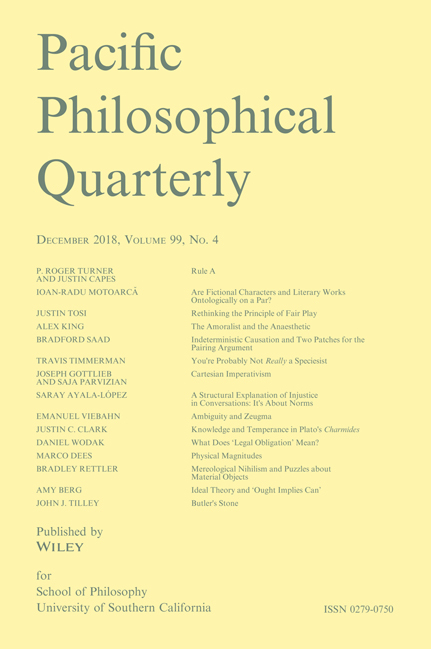Abstract
This article puts pressure on moral motivational internalism and rejects normative motivational internalism by arguing that we should be aesthetic motivational externalists. Parallels between aesthetic and moral normativity give us new reason to doubt moral internalism. I address possible disanalogies, arguing that either they fail, or they succeed, but aren't strong enough to underwrite a motivational difference between the domains. Furthermore, aesthetic externalism entails normative externalism, providing further presumptive evidence against moral internalism. I also make the case that, regardless of these particular conclusions, examining different normative domains alongside each other is a fruitful way to move debates forward.
References
- Archer, A. (2013). ‘Aesthetic Judgments and Motivation,’ Proceedings of the European Society for Aesthetics 5, pp. 67–85.
- Archer, A. (2017). ‘Aesthetic Judgements and Motivation,’ Inquiry: An Interdisciplinary Journal of Philosophy 60(6), pp. 1–22.
- Augustine, St. (1961). Confessions, R.S. Pine-Coffin, trans. Harmondsworth: Penguin Books.
- Björnsson, G. (2002). ‘How Emotivism Survives Immoralists, Irrationality, and Depression,’ Southern Journal of Philosophy 40, pp. 327–344.
- Björnsson, G., Strandberg, C., Francén Olinder, R., Eriksson, J. and Björklund, F. (2015). ‘ Motivational Internalism: Contemporary Debates,’ in Motivational Internalism. Oxford: Oxford University Press, pp. 1–20.
10.1093/acprof:oso/9780199367955.003.0001 Google Scholar
- Blackburn, S. (1998). Ruling Passions. Oxford: Oxford University Press.
10.1093/oso/9780198247852.001.0001 Google Scholar
- Brink, D. (1989). Moral Realism and the Foundations of Ethics. Cambridge: Cambridge University Press.
10.1017/CBO9780511624612 Google Scholar
- Came, D. (2012). ‘Moral and Aesthetic Judgments Reconsidered,’ Journal of Value Inquiry 46, pp. 159–171.
- Cuneo, T. (2014). Speech and Morality. Oxford: Oxford University Press.
10.1093/acprof:oso/9780198712725.001.0001 Google Scholar
- Dancy, J. (1993). Moral Reasons. Oxford: Basil Blackwell.
- Darwall, S. (1983). Impartial Reasons. Ithaca, NY: Cornell University Press.
- Dreier, J. (1990). ‘Internalism and Speaker Relativism,’ Ethics 101(1), pp. 6–26.
- Dreier, J. (2000). ‘Dispositions and Fetishes: Externalist Models of Moral Motivation,’ Philosophy and Phenomenological Research 61, pp. 619–638.
- Eaton, M. M. (2008). ‘Aesthetic Obligations,’ The Journal of Aesthetics and Art Criticism 66, pp. 1–9.
- Foot, P. (1972). ‘Morality as a System of Hypothetical Imperatives,’ Philosophical Review 81, pp. 6–26.
- Gibbard, A. (2003). Thinking how to Live. Cambridge, MA: Harvard University Press.
- Hampshire, S. (1954). ‘ Logic and Appreciation,’ in W. Elton (ed.) Aesthetics and Language. Oxford: Blackwell, pp. 161–169.
- Harman, G. (1977). The Nature of Morality. New York: Oxford University Press.
- Kivy, P. (1980). ‘A Failure of Aesthetic Emotivism,’ Philosophical Studies 38(4), pp. 351–365.
- Kraut, R. (2013). ‘ An Aesthetic Reading of Aristotle's Ethics,’ in V. Harte (ed.) Politeia in Greek and Roman Philosophy. New York: Cambridge University Press, pp. 231–250.
10.1017/CBO9781139096843.016 Google Scholar
- Mabrito, R. (2013). ‘On some Recent Attempts to Resolve the Debate between Internalists and Externalists,’ Southern Journal of Philosophy 51(2), pp. 179–205.
- Mackie, J. (1977). Ethics: Inventing Right and Wrong. Harmondsworth: Penguin Books.
- Mason, E. (2008). ‘An Argument against Motivational Internalism,’ Proceedings of the Aristotelian Society 108, pp. 135–156.
10.1111/j.1467-9264.2008.00240.x Google Scholar
- McDowell, J. (1983). ‘ Aesthetic Value, Objectivity, and the Fabric of the World,’ in E. Schaper (ed.) Pleasure, Preference and Value. Cambridge: Cambridge University Press, pp. 1–16.
- McDowell, J. (1985). ‘ Values and Secondary Qualities,’ in T. Honderich (ed.) Morality and Objectivity. London: Routledge & Kegan Paul, pp. 110–129.
- Milton, J. (2005). Paradise Lost. Indianapolis, IN: Hackett.
- Mishima, Y. (1971). The Temple of the Golden Pavilion, I. Morris, trans. New York: Berkley Medallion Books.
- Nagel, T. (1970). The Possibility of Altruism. Oxford: Oxford University Press.
- Nietzsche, F. (1974). The Gay Science, W. Kaufmann, trans. New York: Random House.
- Francén Olinder, R. (2012). ‘Svavarsdóttir's Burden,’ Philosophia 40, pp. 577–589.
- Plato (2001). The Republic, T. Griffith, trans. Cambridge: Cambridge University Press.
- Press, H. (1969). ‘Aesthetic Obligation,’ The Journal of Philosophy 66, pp. 522–530.
- Prinz, J. (2006). ‘The Emotional Basis of Moral Judgments,’ Philosophical Explorations 9, pp. 29–43.
10.1080/13869790500492466 Google Scholar
- Railton, P. (1986). ‘Facts and Values,’ Philosophical Topics 14(2), pp. 5–31.
- Ridge, M. (2014). Impassioned Belief. Oxford: Oxford University Press.
10.1093/acprof:oso/9780199682669.001.0001 Google Scholar
- Scruton, R. (2011). Beauty. Oxford: Oxford University Press.
- Sinnott-Armstrong, W. (2010). ‘ Mackie's Internalisms,’ in R. Joyce and S. Kirchin (eds) A World without Values. Dordrecht: Springer, pp. 55–70.
10.1007/978-90-481-3339-0_4 Google Scholar
- Smith, M. (1994). The Moral Problem. Oxford: Blackwell.
- Strandberg, C. (2011). ‘A Structural Disanalogy between Aesthetic and Ethical Value Judgements,’ The British Journal of Aesthetics 51(1), pp. 51–67.
- Strandberg, C. (2016). ‘Aesthetic Internalism and Two Normative Puzzles,’ Studi di estetica XLIV(IV:2), pp. 23–70.
- Svavarsdóttir, S. (1999). ‘Moral Cognitivism and Motivation,’ Philosophical Review 108(2), pp. 161–219.
- van Roojen, M. (2010). ‘Moral Rationalism and Rational Amoralism,’ Ethics 120, pp. 495–525.
- Wiggins, D. (2002). ‘ A Sensible Subjectivism,’ in his Needs, Values, Truth: Essays in the Philosophy of Value. Oxford: Clarendon Press, pp. 185–210.
- Wilde, O. (2010). The Picture of Dorian Gray. New York: Penguin Books.
- Wittgenstein, L. (1965). ‘A Lecture on Ethics,’ Philosophical Review 74(1), pp. 3–12.
- Zangwill, N. (1995). ‘The Beautiful, the Dainty, and the Dumpy,’ British Journal of Aesthetics 35(4), pp. 317–329.
- Zangwill, N. (2008). ‘The Indifference Argument,’ Philosophical Studies 138, pp. 91–124.




